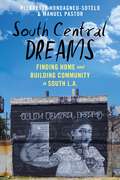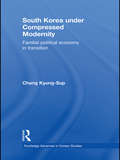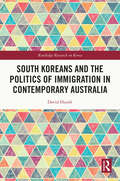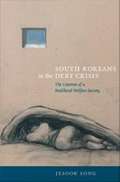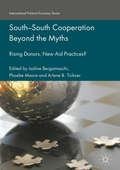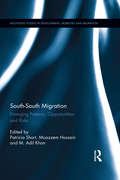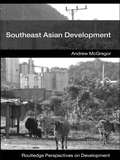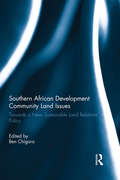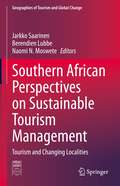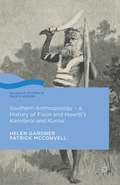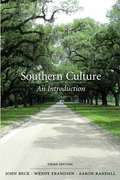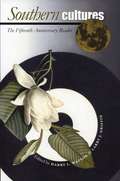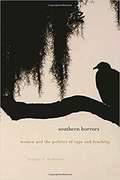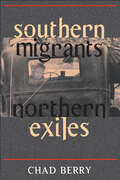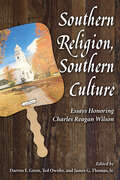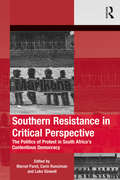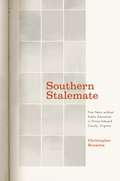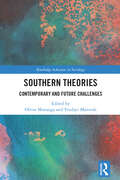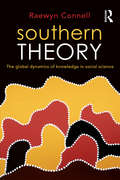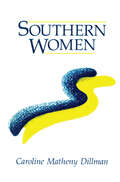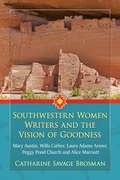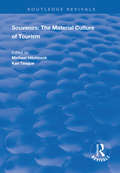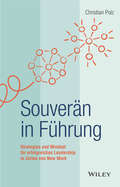- Table View
- List View
South Central Dreams: Finding Home and Building Community in South L.A. (Latina/o Sociology #13)
by Pierrette Hondagneu-Sotelo Manuel PastorWinner of the 2022 Latino/a Section Best Book Award, given by the American Sociological AssociationHonorable Mention for the Robert E. Park Award, given by the Community and Urban Sociology Section of the American Sociological AssociationFinalist for the 2021 C. Wright Mills Award, given by the Society for the Study of Social ProblemsRace, place, and identity in a changing urban America Over the last five decades, South Los Angeles has undergone a remarkable demographic transition. In South Central Dreams, eminent scholars Pierrette Hondagneu-Sotelo and Manuel Pastor follow its transformation from a historically Black neighborhood into a predominantly Latino one, providing a fresh, inside look at the fascinating—and constantly changing—relationships between these two racial and ethnic groups in California. Drawing on almost two hundred interviews and statistical data, Hondagneu-Sotelo and Pastor explore the experiences of first- and second-generation Latino residents, their long-time Black neighbors, and local civic leaders seeking to build coalitions. Acknowledging early tensions between Black and Brown communities. they show how Latino immigrants settled into a new country and a new neighborhood, finding various ways to co-exist, cooperate, and, most recently, demonstrate Black-Brown solidarity at a time when both racial and ethnic communities have come under threat. Hondagneu-Sotelo and Pastor show how Latino and Black residents have practiced, and adapted innovative strategies of belonging in a historically Black context, ultimately crafting a new route to place-based identity and political representation. South Central Dreams illuminates how racial and ethnic demographic shifts—as well as the search for identity and belonging—are dramatically shaping American cities and neighborhoods around the country.
South Korea under Compressed Modernity: Familial Political Economy in Transition (Routledge Advances in Korean Studies)
by Kyung-Sup ChangThe condensed social change and complex social order governing South Koreans’ life cannot be satisfactorily delineated by relying on West-derived social theories or culturalist arguments. Nor can various globally eye-catching traits of this society in industrial work, education, popular culture, and a host of other areas be analyzed without developing innovative conceptual tools and theoretical frameworks designed to tackle the South Korean uniqueness directly. This book provides a fascinating account of South Korean society and its contemporary transformation. Focusing on the family as the most crucial micro foundation of South Korea’s economic, social, and political life, Chang demonstrates a shrewd insight into the ways in which family relations and family based interests shape the structural and institutional changes ongoing in South Korea today. While the excessive educational pursuit, family-exploitative welfare, gender-biased industrialization, virtual demise of peasantry, and familial industrial governance in this society have been frequently discussed by local and international scholarship, the author innovatively explicates these remarkable trends from an integrative theoretical perspective of compressed modernity. The family-centered social order and everyday life in South Korea are analyzed as components and consequences of compressed modernity. South Korea under Compressed Modernity is an essential read for anyone studying Contemporary Korea or the development of East Asian societies more generally.
South Koreans and the Politics of Immigration in Contemporary Australia (Routledge Research on Korea)
by David HundtThe book explores the politics of immigration in Australia through an in-depth study of the ‘new generation’ of young Korean migrants in Melbourne. States with high rates of immigration such as Australia can largely determine who enter their societies, but some migrants, such as younger Koreans, can determine how and where they live due to desirable attributes such as their skills, education, and adaptability. The book uses Albert Hirschman’s ‘exit, voice, and loyalty’ schema to explore the choices available to such new and would-be citizens, especially when faced with economic, social, and/or political decline in their host society. Through in-depth interviews, the book explores if young Koreans were most attracted to the options of staying in Australia (loyalty), changing it from within (voice), or leaving (exit). The most common experience among younger Koreans, the book finds, is loyalty: most respondents express satisfaction with their lives in Australia and want to make it their home. These findings reveal how a particular group of migrants negotiates their citizenship with a would-be host society. By extension, the book illustrates the range and degree of strategies available to other migrants and would-be migrants, and how they might secure their livelihoods and well-being at a time of greater restrictions on international migration. This book will be of interest to scholars of multiculturalism and immigration history in Australia, citizenship and migration, and Korean studies.
South Koreans in the Debt Crisis: The Creation of a Neoliberal Welfare Society
by Jesook SongSouth Koreans in the Debt Crisis is a detailed examination of the logic underlying the neoliberal welfare state that South Korea created in response to the devastating Asian Debt Crisis (1997-2001). Jesook Song argues that while the government proclaimed that it would guarantee all South Koreans a minimum standard of living, it prioritized assisting those citizens perceived as embodying the neoliberal ideals of employability, flexibility, and self-sufficiency. Song demonstrates that the government was not alone in drawing distinctions between the "deserving" and the "undeserving" poor. Progressive intellectuals, activists, and organizations also participated in the neoliberal reform project. Song traces the circulation of neoliberal concepts throughout South Korean society, among government officials, the media, intellectuals, NGO members, and educated underemployed people working in public works programs. She analyzes the embrace of partnerships between NGOs and the government, the frequent invocation of a pervasive decline in family values, the resurrection of conservative gender norms and practices, and the promotion of entrepreneurship as the key to survival. Drawing on her experience during the crisis as an employee in a public works program in Seoul, Song provides an ethnographic assessment of the efforts of the state and civilians to regulate social insecurity, instability, and inequality through assistance programs. She focuses specifically on efforts to help two populations deemed worthy of state subsidies: the "IMF homeless," people temporarily homeless but considered employable, and the "new intellectuals," young adults who had become professionally redundant during the crisis but had the high-tech skills necessary to lead a transformed post-crisis South Korea.
South-South Cooperation Beyond the Myths: Rising Donors, New Aid Practices? (International Political Economy Series)
by Isaline Bergamaschi, Phoebe Moore and Arlene B. TicknerThis book, which brings together scholars from the developed and developing world, explores one of the most salient features of contemporary international relations: South-South cooperation. It builds on existing empirical evidence and offers a comparative analytical framework to critically analyse the aid policies and programmes of ten rising donors from the global South. Amongst these are several BRICS (Brazil, India, China and South Africa) but also a number of less studied countries, including Cuba, Venezuela, the United Arab Emirates, Colombia, Turkey, and Korea. The chapters trace the ideas, identities and actors that shape contemporary South-South cooperation, and also explore potential differences and points of convergence with traditional North-South aid. This thought-provoking edited collection will appeal to students and scholars of international relations, international political economy, development, economics, area studies and business.
South-South Migration: Emerging Patterns, Opportunities and Risks (Routledge Studies in Development, Mobilities and Migration)
by Moazzem Hossain Patricia Short M. Adil KhanSouth-South migration contributes significantly to the development of the emerging economies, the migration of receiving countries and, at the same time, generates a major share of remittance income flowing into the sending countries. By capturing field experience and observations from a number of research studies, this book provides a robust catalogue of data, practical experience and analysis focused on the significant issues, risks and challenges that are associated with this evolving phenomenon in international migration. The book also critically explores new theoretical perspectives by highlighting new policy directions for both sending and receiving countries relevant to making South-South migration more efficient, attractive and mutually beneficial.
Southeast Asian Development (Routledge Perspectives on Development)
by Andrew McGregorSoutheast Asia has long fascinated development practitioners and researchers for being one of the few regions of the world that has resisted global trends to become a successful developing region. Divided into accessible thematic chapters, this book adopts a unique perspective of equitable development to outline the strengths and weaknesses of the transformations taking place in the Southeast Asian region. Focusing on four key themes: equality and inequality; political freedom and opportunity; empowerment and participation; and environmental sustainability, these concepts are used to explore Southeast Asian development and trace the impacts that the growing popularity of market-led and grassroots approaches are having upon economic, political and social processes. Whilst the diversity of the region is emphasized so are some of the homogenizing trends such as the concentration of wealth and services in urban areas and the subsequent migration of rural people into urban factories and squatter settlements. The ongoing commercialization and industrialization of rural agriculture as well as the expansion of non-farm income earning opportunities in rural spaces, and the alarming rates of environmental degradation which threaten health and livelihoods are also exposed. In highlighting how Southeast Asian development is unevenly distributing wealth, opportunities and risks throughout the region, this book emphasizes the need for creative new approaches to ensure that benefits of development are equitably enjoyed by all. Including illustrations, case studies and further reading, this book provides an accessible up-to-date introductory text for students and researchers interested in Southeast Asian development, development studies, Asian studies and geography.
Southern African Development Community Land Issues: Towards a New Sustainable Land Relations Policy
by Ben ChigaraThis book constitutes volume one of a two volume examination of development community land issues in Southern Africa. In this volume, Ben Chigara undertakes a holistic inter-disciplinary evaluation of the legitimacy of colonial and emergent post-colonial rule property rights in affected States of the Southern African Development Community (SADC). It particularly focuses on intensifying litigation in national courts, the SADC Tribunal, and more recently the Washington based International Centre for the Settlement of Investment Disputes (ICSID) regarding counter claims to title to property. The book examines cultural, economic and political drivers at the core of SADC land issues, focusing on their significance and potential to contribute to the discovery of a new, sustainable land relations policy that guarantees social justice in the distribution of all the advantages and disadvantages relating to the allocation and use of land. Chigara shows that persistent systematic administrative failures by pre-colonial, colonial and post-colonial authorities have made for a very complex challenge that requires Solomonic tools that neither the Courts alone, nor human rights centric morality alone could resolutely attend. The book recommends a sophisticated systematic new approach to SADC land issues, which is developed in volume two, Re-conceiving Property Rights in the New Millennium. This book will be of great interest to students and researchers of Property and Conveyancing Law, Human Rights Law and Land Law.
Southern African Perspectives on Sustainable Tourism Management: Tourism and Changing Localities (Geographies of Tourism and Global Change)
by Jarkko Saarinen Berendien Lubbe Naomi N. MosweteThis edited collection focuses on tourism development, sustainability and local change in southern Africa. The book offers a range of both conceptual and applied perspectives that address various changes in southern African tourism and community development relations. The key drivers of change that include climate change and globalization form the context for the diverse and interesting set of case studies from the region. The main conceptual grounds of the book cover sustainability, sustainable development goals (SDGs), responsibility, vulnerability, adaptation, resilience, governance, local development and inclusive growth. In this book sustainability is seen as one of the most important issues currently facing the tourism sector, affecting all types and scales of tourism operations and environments in the region. Tourism is an increasingly important economy in the southern African region and the industry is creating changes for communities and environment while also facing major challenges caused by global trends and changes. The book offers a case study driven approach to sustainability needs of tourism development in local community contexts. The case study chapters are linked through the book’s focus on sustainable tourism and local community development. Through emphasizing the need to understand both global change and local contexts in sustainable tourism development, this book is a valuable resource for all those working in the field.
Southern Anthropology - a History of Fison and Howitt’s Kamilaroi and Kurnai: A History Of Fison And Howitt's Kamilaroi And Kurnai (Palgrave Studies in Pacific History)
by Helen Gardner Patrick McConvellSouthern Anthropology, the history of Fison and Howitt's Kamilaroi and Kurnai is the biography of Kamilaroi and Kurnai (1880) written from both a historical and anthropological perspective. Southern Anthropology investigates the authors' work on Aboriginal and Pacific people and the reception of their book in metropolitan centres.
Southern Asia, Australia and the Search for Human Origins
by Robin Dennell Martin PorrThis is the first book to focus on the role of Southern Asia and Australia in our understanding of modern human origins and the expansion of Homo sapiens between East Africa and Australia before 30,000 years ago. With contributions from leading experts that take into account the latest archaeological evidence from India and Southeast Asia, this volume critically reviews current models of the timing and character of the spread of modern humans out of Africa. It also demonstrates that the evidence from Australasia should receive much wider and more serious consideration in its own right if we want to understand how our species achieved its global distribution. Critically examining the 'Out of Africa' model, this book emphasises the context and variability of the global evidence in the search for human origins.
Southern Culture: An Introduction
by John Beck; Wendy Frandsen; Aaron RandallFrom the very beginning the South was different. The source and significance of this difference has been debated and discussed for over 200 years. In recent decades, the demise of the South as a regional culture has frequently been predicted, although now some scholars and journalists are maintaining that it is proving to be remarkably resilient and is actually having an ever greater influence on the broader American culture. <P><P>Southern Culture examines the origins and evolution of the region's culture and focuses on six key patterns that have defined it: agrarianism, class relations, race relations, gender and family traditions, evangelical Christianity, and political traditions. <P><P>Southern Culture also explores the products of the culture with major sections on dialect, painting, architecture, pottery, music, literature, and icons and myths. It concludes with essays by each of the authors in which they reflect on where Southern culture is headed. <P><P>This new edition includes updating of the chapter on politics as well as updating of sources throughout.
Southern Cultures: The Fifteenth Anniversary Reader
by Harry L. Watson Larry J. GriffinWhat does "redneck" mean? What's going to happen to the southern accent? What makes black southerners laugh? What is "real" country music? These are the kinds of questions that pop up in this collection of notable essays from Southern Cultures, the journal of the Center for the Study of the American South at the University of North Carolina at Chapel Hill. <P><P> Intentionally plural, Southern Cultures was founded in 1993 to present all sides of the American South, from sorority sisters to Pocahontas, from kudzu to the blues.This volume collects 27 essays from the journal's first fifteen years, bringing together some of the most memorable and engaging essays as well as some of those most requested for use in courses. A stellar cast of contributors discusses themes of identity, pride, traditions, changes, conflicts, and stereotypes. Topics range from black migrants in Chicago to Mexican immigrants in North Carolina, from Tennessee wrestlers to Martin Luther King, from the Civil War to contemporary debates about the Confederate flag. Funny and serious, historical and contemporary, the collection offers something new for every South-watcher, with fresh perspectives on enduring debates about the people and cultures of America's most complex region.
Southern Gaul and the Mediterranean
by Alex MullenThe interactions of the Celtic-speaking communities of Southern Gaul with the Mediterranean world have intrigued commentators since antiquity. This book combines sociolinguistics and archaeology to bring to life the multilingualism and multiple identities of the region from the foundation of the Greek colony of Massalia in 600 BC to the final phases of Roman Imperial power. It builds on the interest generated by the application of modern bilingualism theory to ancient evidence by modelling language contact and community dynamics and adopting an innovative interdisciplinary approach. This produces insights into the entanglements and evolving configurations of a dynamic zone of cultural contact. Key foci of contact-induced change are exposed and new interpretations of cultural phenomena highlight complex origins and influences from the entire Mediterranean koine. Southern Gaul reveals itself to be fertile ground for considering the major themes of multilingualism, ethnolinguistic vitality, multiple identities, colonialism and Mediterraneanization.
Southern Horrors: Women And The Politics Of Rape And Lynching
by Crystal N. FeimsterBetween 1880 and 1930, close to 200 women were murdered by lynch mobs in the American South. Many more were tarred and feathered, burned, whipped, or raped. In this brutal world of white supremacist politics and patriarchy, a world violently divided by race, gender, and class, black and white women defended themselves and challenged the male power brokers. Crystal Feimster breaks new ground in her story of the racial politics of the postbellum South by focusing on the volatile issue of sexual violence. Pairing the lives of two Southern women―Ida B. Wells, who fearlessly branded lynching a white tool of political terror against southern blacks, and Rebecca Latimer Felton, who urged white men to prove their manhood by lynching black men accused of raping white women―Feimster makes visible the ways in which black and white women sought protection and political power in the New South. While Wells was black and Felton was white, both were journalists, temperance women, suffragists, and anti-rape activists. By placing their concerns at the center of southern politics, Feimster illuminates a critical and novel aspect of southern racial and sexual dynamics. Despite being on opposite sides of the lynching question, both Wells and Felton sought protection from sexual violence and political empowerment for women. Southern Horrors provides a startling view into the Jim Crow South where the precarious and subordinate position of women linked black and white anti-rape activists together in fragile political alliances. It is a story that reveals how the complex drama of political power, race, and sex played out in the lives of Southern women.
Southern Migrants, Northern Exiles
by Chad BerryOne of the largest internal migrations in U.S. history, the great white migration left its mark on virtually every family in every southern upland and flatland town. In this extraordinary record of ordinary lives, dozens of white southern migrants describe their experiences in the northern "wilderness" and their irradicable attachments to family and community in the South. Southern out-migration drew millions of southern workers to the steel mills, automobile factories, and even agricultural fields and orchards of Ohio, Indiana, Michigan, and Illinois. Through vivid oral histories, Chad Berry explores the conflict between migrants' economic success and their "spiritual exile" in the North. He documents the tension between factory owners who welcomed cheap, naive southern laborers and local "native" workers who greeted migrants with suspicion and hostility. He examines the phenomenon of "shuttle migration," in which migrants came north to work during the winter and returned home to plant spring crops on their southern farms. He also explores the impact of southern traditions--especially the southern evangelical church and "hillbilly" music--brought north by migrants. Berry argues that in spite of being scorned by midwesterners for violence, fecundity, intoxication, laziness, and squalor, the vast majority of southern whites who moved to the Midwest found the economic prosperity they were seeking. By allowing southern migrants to assess their own experiences and tell their own stories, Southern Migrants, Northern Exiles refutes persistent stereotypes about migrants' clannishness, life-style, work ethic, and success in the North.
Southern Religion, Southern Culture: Essays Honoring Charles Reagan Wilson (Chancellor Porter L. Fortune Symposium in Southern History Series)
by Darren E. Grem, Ted Ownby, and James G. ThomasContributions by Ryan L. Fletcher, Darren E. Grem, Paul Harvey, Alicia Jackson, Ted Ownby, Otis W. Pickett, Arthur Remillard, Chad Seales, and Randall J. StephensOver more than three decades of teaching at the University of Mississippi, Charles Reagan Wilson’s research and writing transformed southern studies in key ways. This volume pays tribute to and extends Wilson’s seminal work on southern religion and culture. Using certain episodes and moments in southern religious history, the essays examine the place and power of religion in southern communities and society. It emulates Wilson’s model, featuring both majority and minority voices from archives and applying a variety of methods to explain the South’s religious diversity and how religion mattered in many arenas of private and public life, often with life-or-death stakes.The volume first concentrates on churches and ministers, and then considers religious and cultural constructions outside formal religious bodies and institutions. It examines the faiths expressed via the region’s fields, streets, homes, public squares, recreational venues, roadsides, and stages. In doing so, this book shows that Wilson’s groundbreaking work on religion is an essential part of southern studies and crucial for fostering deeper understanding of the South’s complicated history and culture.
Southern Resistance in Critical Perspective: The Politics of Protest in South Africa's Contentious Democracy (The Mobilization Series on Social Movements, Protest, and Culture)
by Marcel Paret Carin Runciman Luke SinwellFrom the Arab Uprising, to anti-austerity protests in Europe and the US Occupy Movement, to uprisings in Brazil and Turkey, resistance from below is flourishing. Whereas analysts have tended to look North in their analysis of the recent global protest wave, this volume develops a Southern perspective through a deep engagement with the case of South Africa, which has experienced widespread popular resistance for more than a decade. Combining critical theoretical perspectives with extensive qualitative fieldwork and rich case studies, Southern Resistance in Critical Perspective situates South Africa’s contentious democracy in relation to both the economic insecurity of contemporary global capitalism and the constantly shifting political terrain of post-apartheid nationalism. The analysis integrates worker, community and political party organizing into a broader narrative of resistance, bridging historical divisions between social movement studies, labor studies and political sociology.
Southern Stalemate: Five Years without Public Education in Prince Edward County, Virginia
by Christopher BonastiaIn 1959, Virginia’s Prince Edward County closed its public schools rather than obey a court order to desegregate. For five years, black children were left to fend for themselves while the courts decided if the county could continue to deny its citizens public education. Investigating this remarkable and nearly forgotten story of local, state, and federal political confrontation, Christopher Bonastia recounts the test of wills that pitted resolute African Americans against equally steadfast white segregationists in a battle over the future of public education in America. Beginning in 1951 when black high school students protested unequal facilities and continuing through the return of whites to public schools in the 1970s and 1980s, Bonastia describes the struggle over education during the civil rights era and the human suffering that came with it, as well as the inspiring determination of black residents to see justice served. Artfully exploring the lessons of the Prince Edward saga, Southern Stalemate unearths new insights about the evolution of modern conservatism and the politics of race in America.
Southern Theories: Contemporary and Future Challenges (Routledge Advances in Sociology)
by Oliver Mutanga Tendayi MarovahThis book critically explores Global South perspectives, examining marginalised voices and issues whilst challenging the supremacy of Global North perspectives in literature. The unique value of this book lies in its extensive coverage of various Southern challenges, including disaster management, climate change, communication, resilience, gender, education, and disability. It also underscores the relevance of indigenous philosophies such as animism, Buen Vivir, Buddhism, Confucianism, Daoism, Neozapatism, Qi vitality, Taoism, and Ubuntu. Stemming from regions as diverse as Sub-Saharan Africa, Asia, and Latin America, these philosophies are brought into public discourse. By demonstrating their practicality in designing intervention programs and influencing policy-making, the book fills a critical gap in global Southern literature while promoting context-specific knowledge for improving well-being in the Global South contexts. This book’s content resonates with a diverse audience, encompassing students, academics, researchers, NGOs, and policymakers from postcolonial states in the Global South and those from Global North countries. Furthermore, it is highly relevant to communities within the Global North that mirror the Global South – those grappling with equity issues for indigenous populations. It has a versatile appeal that transcends disciplinary boundaries, encompassing cultural studies, sociology, international development, philosophy, and postcolonial studies, thus making it accessible to all educational levels. It holds particular interest for those in development studies, indigenous studies, government departments globally, international organisations, and universities worldwide.
Southern Theory: The global dynamics of knowledge in social science
by Raewyn ConnellSouthern Theory presents the case for a radical re-thinking of social science and its relationships to knowledge, power and democracy on a world scale.Mainstream social science pictures the world as understood by the educated and affluent in Europe and North America. From Weber and Keynes to Friedman and Foucault, theorists from the global North dominate the imagination of social scientists, and the reading lists of students, all over the world. For most of modern history, the majority world has served social science only as a data mine.Yet the global South does produce knowledge and understanding of society. Through vivid accounts of critics and theorists, Raewyn Connell shows how social theory from the world periphery has power and relevance for understanding our changing world from al-Afghani at the dawn of modern social science, to Raul Prebisch in industrialising Latin America, Ali Shariati in revolutionary Iran, Paulin Hountondji in post-colonial Benin, Veena Das and Ashis Nandy in contemporary India, and many others.With clarity and verve, Southern Theory introduces readers to texts, ideas and debates that have emerged from Australia's Indigenous people, from Africa, Latin America, south and south-west Asia. It deals with modernisation, gender, race, class, cultural domination, neoliberalism, violence, trade, religion, identity, land, and the structure of knowledge itself.Southern Theory shows how this tremendous resource has been disregarded by mainstream social science. It explores the challenges of doing theory in the periphery, and considers the role Southern perspectives should have in a globally connected system of knowledge. Southern Theory draws on sociology, anthropology, history, psychology, economics, philosophy and cultural studies, with wide-ranging implications for social science in the 21st century.
Southern Women
by Caroline M. DillmanFirst published in 1988. Routledge is an imprint of Taylor & Francis, an informa company.
Southwestern Women Writers and the Vision of Goodness: Mary Austin, Willa Cather, Laura Adams Armer, Peggy Pond Church, Alice Marriott
by Catharine Savage BrosmanThis book, a project in literary history and criticism, examines five women authors of the American Southwest, two well known, three much less so: They stand out for their striving to give a woman's voice to aspects of the Southwest as it was during their lifetimes. All five authors displayed sensitivity to and concern for southwestern landscapes, arts, and people; they valued harmony in human relationships and endeavors; they were interested in the past and sought to preserve it. Marked differences in experience, temperaments, talents, and perspectives exist among them, however, although their common feminine condition supposes some similarity of approach, including limitations (biological and, to some degree, social).
Souvenirs: The Material Cultre of Tourism (Routledge Revivals)
by Michael Hitchcock Ken TeagueThis title was first published in 2000: Souvenirs, broadly conceived, are generally thought to be the material counterpart of travels, events, relationships and memories of all kinds. The material items classed as souvenirs discussed in this text have memorial functions, usually connected with the owner's travels. But not all of the items are souvenirs of tourism; they are also souvenirs of other past phenomena, such as political events (suffragettes), colonial history (India), former artistic pre-eminence (Awaji Ningyo puppetry) or former ways of life (South American ceramic archaisms). The authors do not necessarily focus on material souvenirs in their memorial function as prompters of memory. They also use their case studies as starting points for the discussion of many interesting contemporary phenomena, such as cottage industries for economic development in Mexico and Ainu, as devices to invigorate or maintain artistic practices, as emblems of cultural conformity (Surrealists) or as symbolic weapons in national and international political arguments. A key focus of many of the chapters is the question of meaning: what is the meaning of any particular souvenir or collection, and for whom does it bear that meaning?
Souverän in Führung: Strategien und Mindset für erfolgreiches Leadership in Zeiten von New Work
by Christian PolzNichts ist, wie es mal war. Die Herausforderungen der modernen Arbeitswelt erfordern es, Führung neu zu denken, neu zu justieren und neu auszurichten. Der Autor beschreibt in seinem praxisorientierten Ratgeber, wie Führung heute und zukünftig gelingt. Im Fokus steht das Collective Leadership: Jeder im Unternehmen, jeder in der Abteilung und jeder im Team übernimmt Verantwortung. Will, darf und soll Verantwortung übernehmen. "Wir sind alle Leader!", so das Leitmotiv. Wer Collective Leadership etablieren will, durchläuft einen Entwicklungsprozess. Collective Leadership bedeutet Mitarbeiter, die sich selbst führen können und wollen, aber es gibt auch Mitarbeiter und Situationen, in denen die Führungskraft zum Beispiel direktiv oder transaktional agieren muss. Sie muss beides können und darum Führungssouveränität und Führungsstilsouveränität aufbauen. Dazu gehört auch das entsprechende Mindset. Zu diesem Mindset gehört, die Auseinandersetzung mit dem eigenen Menschenbild, den Kompetenzen und Fähigkeiten (Stichwort Selbstreflexion). Christian Polz stellt die Entwicklung zur souveränen Führungspersönlichkeit und zu Collective Leadership in drei Teilen dar: Der Beschreibung des Konzepts des souveränen Führens folgt die Erläuterung des dazu notwendigen Mindsets. Im dritten Teil steht die Umsetzung im Vordergrund. Neben der Darstellung des Konzeptes des souveränen Führens und des Mindsets der souveränen Führungspersönlichkeit bietet dieser Umsetzungsteil ein Highlight. Dort veranschaulicht Christian Polz die wichtigsten Führungsansätze und Führungsstile in einem fiktiven Dialog zwischen einem Coach und einer "lernenden" Führungskraft. Der Autor nutzt seine Erfahrungen und zahlreichen Gespräche mit Unternehmern, Inhabern, Selbstständigen, Vorständen, Geschäftsführern, Managern und Führungskräften, um ein authentisches und realistisches Bild einer neuen Führung zu kreieren. Dazu arbeitet er mit vielen Beispielen aus seinem Erfahrungsschatz, den er als Berater, Coach, Trainer und Supervisor aufgebaut hat.
